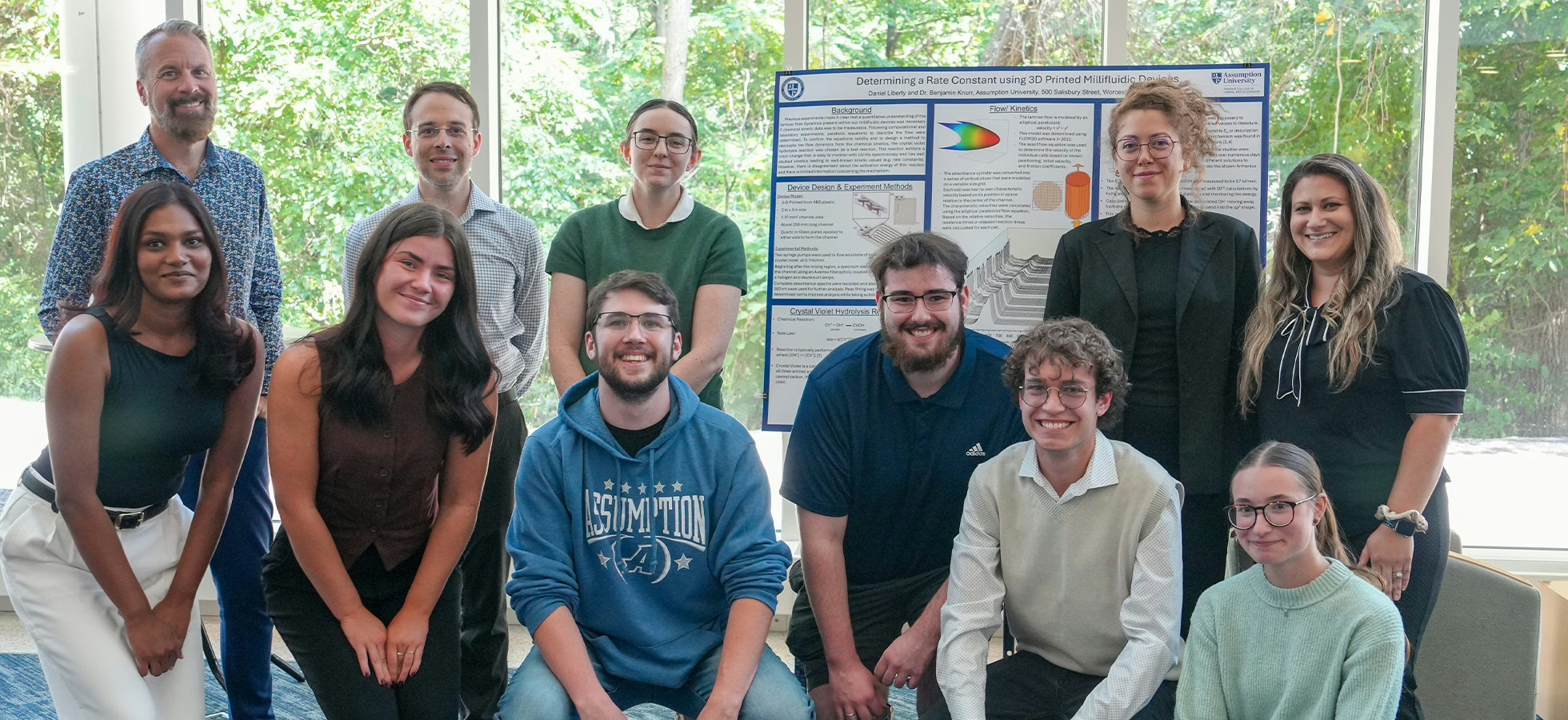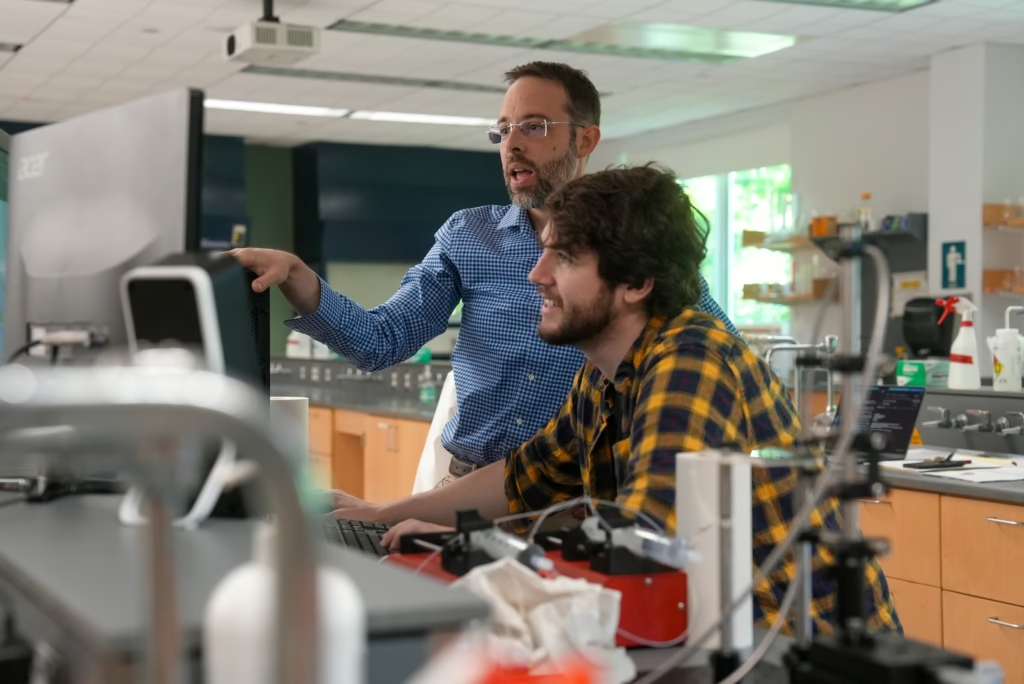Assumption Students Take Part in 2025 Summer Scholars Program

Over the course of ten weeks this summer, eight Assumption students worked closely with faculty on important research projects through a paid internship program that offers a glimpse into potential futures in their chosen fields.
“AU Summer Scholars are paired directly with faculty on original research projects in a wide range of disciplines. Regardless of that discipline, students gain insight into the various scholarly activities of our faculty and become better prepared for future careers and studies,” said program director Ben Knurr, associate professor of chemistry. “That mutually beneficial mentorship inspires students to pursue answers to deep, original questions, while offering faculty a fresh view of their projects.”
This was the program’s inaugural year, created and sponsored by the D’Amour College of Liberal Arts and Sciences Dean’s Office, Honors Program, Department of Biological and Physical Sciences, and the Center for Neuroscience as part of a broader initiative to standardize the various research opportunities in which students participate across campus.
Experimenting With New Ways of Collecting Scientific Information
Daniel Liberty ’26, a chemistry major, worked with Knurr to study the k value—how fast a reaction progresses—of different solutions. Their specific experiment focused on the reaction between crystal violet and sodium hydroxide, where the k value was already known, and working backward to see if they could find the same value mathematically by separating the effects of friction.
“The research is really a proof of concept that asks, ‘is this a sound way to go about collecting data?’” Liberty said. “We printed a device, flowed the solutions through them, and then we took absorbance readings all along the channels and mathematically decoupled those readings using a math program and an equation that Professor Knurr tweaked for this purpose.”
Liberty, who aims to eventually receive his Ph.D. in chemistry, said that this summer research experience helped him to envision his future in the field.
“I’ve really enjoyed the research process to the point that I’m re-evaluating what I want to do in the chemistry sphere,” said Liberty. “I had a lot of fun doing this, learning about all the machines that we don’t get to use during our normal labs.”

Researching the Advertisements of the Revolution
Massimo Sgambati ’26, an education and history double major, worked with professor of history Carl Keyes on his ongoing Slavery Adverts 250 Project. Since 2016, Keyes has compiled and posted slavery advertisements from eighteenth-century newspapers.
Sgambati’s summer research focused on examining historical newspapers at the American Antiquarian Society and finding advertisements for enslaved people during the revolutionary period, from 1775-1777. The advertisements that Sgambati found and analyzed began to be posted on the Adverts 250 website on September 21.
“The thing that surprised me most was how the advertisements appeared in states across the country—from Massachusetts all the way down to South Carolina,” said Sgambati. “The language they use in the ads and how open they are about slavery was also shocking. The racism they portrayed was so blatant.”

Creating AI Software from Scratch
Keegan Concannon ’27, a double major in computer science and cybersecurity, worked with assistant professor of computer science Benz Tran to use artificial intelligence and machine learning to create an intrusion detection system (IDS). An IDS is software that monitors for suspicious network activity and alerts security teams when this activity occurs.
“Professor Tran wanted to help me research something that connects both of my majors,” Concannon said. “It’s been interesting to learn and dive into the AI creation pipeline. I didn’t have much previous experience, and now I know the entire process from start to finish.”
Concannon said that doing this research has helped him to discover his own perseverance and capabilities, pushing himself to go beyond what he thought he could do.
“It’s been great to learn and see myself grow,” he said. “I can do a lot more than I thought I could, and Professor Tran has acknowledged how much I’ve grown, saying I’ve gone from a white sheet of paper to creating an entire AI.”

While these are just a few examples of the exciting research that occurred on Salisbury Street over the summer, the full list of students and faculty who participated in the 2025 Summer Scholars Program is as follows:
- Joseph Benway ’28 and Meltem Karaca, assistant professor of psychology; Motivational Factors for Memory Performance
- Keegan Concannon ’27 and Benz Tran, assistant professor of computer science; An AI approach For Real-time Network Traffic Intrusion Detection
- Lillian Dolan ’26 and Nicole Pantano, assistant professor of psychology; Language Acquisition and Sequencing in Children with ASD
- Anastasia Hayes ’27, Erin Tuttle, assistant professor of environmental chemistry, and Soraya Betancourt-Calle, associate professor of biology; Biotoxicity of Plastic Additive Degradants
- Daniel Liberty ’26 and Benjamin Knurr, associate professor of chemistry; Kinetic Studies using Millifluidic Devices
- Massimo Sgambati ’26 and Carl Keyes, professor of history; Slave Adverts 250 Project
- Samiha Osman Tutul ’27 and Erin Tuttle, assistant professor of environmental chemistry; Chemical Stability of Plastic Additives During Sample Workup Methods
- Liam Waldron ’28 and Georgi Georgiev, professor of physics; Exploring Self-Organization in Non-Equilibrium Thermodynamic Systems through Agent-Based Modeling
New summer scholar projects are being proposed each year in different disciplines. For more information, and to see a list of past summer scholar projects, visit the Summer Scholars webpage.
